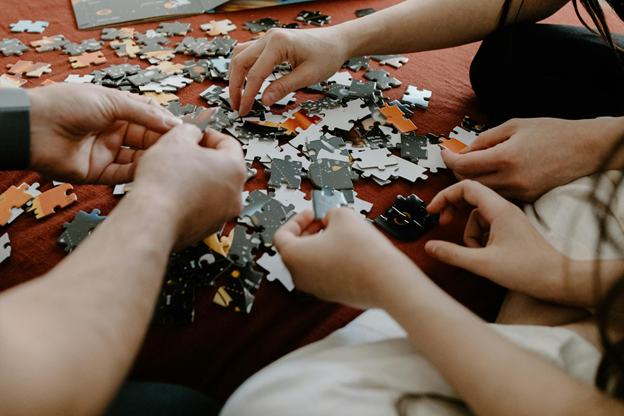In a world overflowing with digital distractions, one humble pastime has remained steadfast, quietly offering both challenge and comfort: the jigsaw puzzle. Though it may seem quaint at first glance, jigsaw puzzles are far from outdated.
They’re deeply woven into the fabric of human curiosity and learning, making them an ideal activity for all occasions—whether you're flying solo or gathering with friends. At parties, they spark collaboration and laughter. Alone, they draw you into a satisfying rhythm of pattern and problem-solving. So why are jigsaw puzzles for adults the ultimate game? Let’s piece it all together.
The Party Game That Brings Everyone Together
Forget icebreakers and awkward small talk. A jigsaw puzzle on a table immediately becomes the most magnetic spot at any adult party. It invites people of all backgrounds, ages, and interests to gather around and contribute to a common goal.
Unlike competitive games that pit players against each other, puzzles promote cooperation. It’s not about winning or losing—it’s about working together, quietly celebrating small victories as pieces click into place.
Jigsaw puzzles are also low-pressure. No one has to “go first,” and people can join or leave as they please. There’s something casual and welcoming about a table of pieces waiting to be solved. It naturally fosters conversation and teamwork, turning strangers into friends, and friends into an efficient assembly line of problem-solvers.
And when the puzzle starts to come together, there’s a collective sense of achievement that’s hard to replicate. People point out shapes they recognize, call out matching pieces, and encourage others. It’s the kind of shared experience that turns into stories long after the last piece is placed.
The Solo Game That Feeds the Soul
While jigsaw puzzles for adults shine in social settings, they’re equally fulfilling when enjoyed alone. There’s a meditative quality to sitting down and sorting through pieces, letting your mind settle into the calm logic of pattern-matching. In a world that demands multitasking and constant input, puzzles offer a rare chance to slow down and focus.
Doing a jigsaw puzzle solo isn’t just relaxing—it’s mentally enriching. Each decision made while solving a puzzle flexes your brain’s problem-solving muscles. You recognize shapes and colors, recall where you saw similar patterns, and test out pieces that might fit. This unique blend of visual-spatial reasoning and memory recall provides real cognitive benefits.
Even more, puzzles train your brain to recognize structure in chaos. What begins as a jumbled mess of pieces transforms into something whole and coherent. That process is deeply satisfying, and it taps into a universal human drive to bring order to disorder—a skill that goes beyond games and into everyday life.
The Ancient Allure of Puzzles
Our attraction to puzzles isn’t new. From ancient riddles to labyrinths and brain teasers, humanity has always been captivated by the challenge of solving something that initially seems unsolvable. Whether it’s the riddle of the Sphinx or an elaborate mathematical equation, the desire to crack a code is universal.
That’s because puzzles aren’t just games—they’re mirrors of how we learn and grow. From early childhood, we begin to understand the world through patterns, repetition, and problem-solving. As adults, jigsaw puzzles return us to that foundational mode of learning. They’re playful yet meaningful, stimulating both memory and creative thinking.
Modern imaging studies even show that people who solve puzzles with bursts of insight—those “aha!” moments—experience a wave of positive emotion and satisfaction. These mini-epiphanies stimulate dopamine release, essentially giving your brain a reward every time a puzzle piece fits into place.
Mental Workouts That Feel Like Play
The magic of jigsaw puzzles lies in how they make problem-solving fun. There's a challenge, yes—but not too much. They hit the sweet spot between difficulty and reward. Each piece that fits gives you momentum, yet each section yet to be solved dares you to keep going. Unlike many activities that rely purely on logic or chance, puzzles blend both linear thinking and creative insight.
What sets jigsaw puzzles apart from other games is their allowance for both trial-and-error and lateral thinking. When one method doesn’t work—say, trying to force a sky-blue piece into the wrong corner—you start to view the puzzle differently. You rotate the piece. You shift your attention. You reframe the problem. This constant rebalancing between logic and creativity keeps your brain agile and engaged.

Stress Relief in Every Piece
Life can be chaotic—but puzzles offer a break. As you search for matching colors or edges, your mind enters a state of flow. External worries fade away. The slow, methodical nature of puzzling is not just entertaining—it’s therapeutic. This soothing rhythm helps reduce stress and quiet the mental noise that often comes with adult responsibilities.
And because you can do puzzles at your own pace, they cater perfectly to any lifestyle. Have ten minutes before bed? Fit a few pieces. Want to unwind after work? Work on a section of the puzzle. Need a screen-free weekend activity? Dump the pieces on the table and lose yourself in the task. The flexible nature of puzzles makes them accessible, no matter how busy your schedule.
Universally Understood, Eternally Enjoyed
What’s truly remarkable is that puzzles transcend language, culture, and time. Nearly everyone has puzzled in some form—whether it’s assembling a jigsaw, decoding a riddle, or navigating a maze. There’s something fundamentally human about the urge to solve, to piece together fragments into a meaningful whole.
Jigsaw puzzles tap into that primal urge in a tactile, tangible way. They're approachable to beginners yet satisfying for seasoned solvers. Whether the puzzle has 100 pieces or 5,000, it offers a kind of fulfillment that doesn’t diminish with repetition. In fact, many puzzle fans do the same puzzles more than once, simply for the joy of the process.
Final Piece: Why Puzzles Belong at Every Adult Party
So next time you plan a get-together, consider swapping the typical party games for a jigsaw puzzle. It’s a natural conversation starter, a bonding experience, and an activity that brings out the best in people—patience, observation, encouragement, and collaboration.
But the puzzle’s power doesn’t end with the party. As a solo activity, it’s equally valuable. Jigsaw puzzles train your brain, calm your nerves, and provide a deep, satisfying sense of accomplishment. In a world full of fleeting entertainments, puzzles offer something lasting—something whole.
No batteries. No screen. Just you, some pieces, and the pleasure of fitting it all together. And that’s why jigsaw puzzles for adults aren’t just games—they’re timeless tools for joy, connection, and inner peace.
Visit MakeYourPuzzles now and create a custom jigsaw puzzle you and your friends will enjoy to complete!






